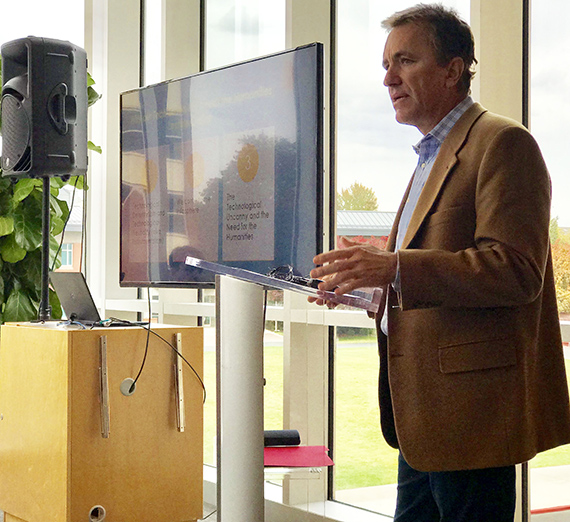Arnold Professor Besmer: Why Society Needs the Humanities

Kirk Besmer's job is to ask the questions society doesn't think about, sometimes at its own peril.
Besmer, professor of philosophy at Gonzaga, kicked off his Arnold Distinguished Professor term with a look at the impact technology has on our modern lives.
Besmer delivered his installation lecture, "Why our Tech-Driven Lives Need the Humanities," to a packed Jundt Lounge gathering on ZagFam Weekend. The address set the tone for his broader theme of "Technology and the Human Condition."
In a lecture that started with a reference to the movie "Die Hard" and pivoted to Socrates, Besmer broke down our zombie-like addiction to technology (referred to as "technological somnambulism"). Besmer pointed out that as we adopt new technologies individually, we end up missing the cumulative effect of them on every aspect of our lives. However, he offered a proposed solution: the humanities can help us to be more vigilant.
"I suggest we follow Socrates' dictum. He famously claimed that "an unexamined life is not worth living," which implies that the examined life is the best kind of human life," said Besmer. "Because technologies are deeply implicated in our current habits and practices as well as implied in our beliefs and values, then living an examined life today must include critical reflection on technology, and since cultivating the desire and capacity for living an examined life is precisely what the humanities have always done, it seems to follow that we ought to look to the humanities to satisfy Socrates' dictum."
Achieving this goal can assume varied approaches. As an example, Gonzaga's humanities offerings are central to its Jesuit-based liberal arts approach of educating the "whole person." Besmer says there are benefits to a society where individuals are engaged in holistic thought.
"When people begin thinking about the role of technology in their lives, they tend to take a broad, general view and ask something like: What is the actual relationship between society and technology? Responses to this question break one of two ways: They either see technologies as simple tools that humans use and then put away, but which leave humans unaffected, or they claim that technology is a central agent of social change, an autonomous force playing out its logic in society and that all we can do is sit back and suffer the consequences. … Both views are widespread, and both views are plausible at first glance. But, I contend, both views are incomplete on further investigation," he said.
The dynamic tension between humans and technology prompts a set of challenging questions about "how technology is humanized and humans are technologized," Besmer described.
While the answers aren't absolute, Besmer went on to "show his work" about his hypothesis and concluded with the promise of the process: "There is no escaping technological innovation and consequent cultural change, but with the humanities, we can approach it in way that allows us to fulfill Socrates' dictum to live an examined life, which after all is the best kind of life."
- Jeff Bunch
